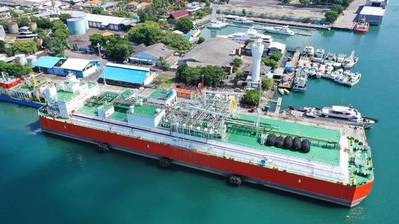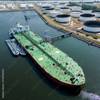Gasunie to Charter New Fortress Energy FSRU to Reduce Dutch Reliance on Russian Gas
New Fortress Energy has executed a binding agreement to charter a floating storage and regasification unit (“FSRU”) to Dutch energy network operator Gasunie, in an effort by the Netherlands to reduce Russian gas imports.
The chartered FSRU will provide storage capacity of approximately 170,000 m3 of liquefied natural gas with peak regasification capacity of 900 mmscfd.
New Fortress Energy's FSRU will work in tandem with a third party’s FSRU to provide up to 8 bcm per year of total regas capacity.
"The vessel will provide a core component of Gasunie’s Eems Energy Terminal which will immediately address the urgent energy security needs of the Netherlands and surrounding region as the U.S.-EU Task Force on Energy Security continues to implement the March 25 joint statement by Presidents Biden and von der Leyen," New Fortress Energy said.
The binding FSRU charter agreement is subject to the execution of definitive documentation which is expected to be completed in the coming weeks.
The 5-year FSRU charter agreement will begin in Q3 2022 and provide storage and regasification capacity for Gasunie’s new LNG import terminal in the port Eemshaven, the Netherlands.
The Eems Energy Terminal will add approximately 8 bcm per year of new regasification capacity for NW Europe, with an expected start-up in Q3 2022.
"This new terminal capacity will increase energy security for The Netherlands and create sufficient LNG import capacity to meet the country’s gas needs without relying on pipeline imports, including gas from Russia," New Fortress Energy said.
"We are pleased to be working with Gasunie, one of Europe’s leading energy infrastructure companies, to add LNG import capacity and strengthen the energy security of the Netherlands and surrounding European countries,” said Wes Edens, Chairman and CEO of New Fortress Energy. “We look forward to a successful, long-term partnership with Gasunie and see other areas for collaboration to enhance energy security and accelerate energy transition in Europe.”
The Dutch government in April said it planned to stop using Russian fossil fuels by the end of the year, promising to spend an estimated 623 million euros on incentives for firms to fill a major gas storage facility.
About 44% of Dutch energy usage is based on gas - one of the highest rates in Europe - but only about 15% of Dutch gas comes from Russia, according to government estimates,Reuters reported on April 22.
Ulco Vermeulen, member of the Executive Board of Gasunie, is pleased with the cooperation with New Fortress Energy: “This decisive cooperation with NFE enables us to increase the security of supply of natural gas in the Netherlands from Eemshaven (Northern Netherlands) as early as this autumn.
"This new terminal capacity will increase energy security for the Netherlands and North-West Europe and create additional LNG import capacity to reduce dependence on Russian gas. With this expansion of the terminal we will be able to facilitate the high demand for LNG supply in the market in the next five years,” said Vermeulen.
Rising FSRU Demand
According to World Energy Reports, there has been a growing interest in FSRUs recently, especially in Europe, mostly driven by fear of gas supply interruptions from Russia.
Last week, Germany signed charters for four FSRUs units as it works to become less reliant on Russian gas, as FSRUs will enable it to import LNG from other sources. The agreements were signed for the charters of two FSRUs owned by Oslo-listed firm Hoegh LNG, and two owned by Dynagas. Hoegh LNG FSRUs will be operated by RWE, while Uniper has facilitated the charter of two FSRUs managed by Dynagas Ltd.
Elsewhere in Europe, the kick-off ceremony was held last week for the realization of Gastrade SA's LNG FSRU facility in Alexandroupolis, Greece. The 5.5 billion c.m. per year Alexandroupolis FSRU, which will supply gas to Southeastern Europe, is expected to become operational by the end of 2023.
World Energy Reports' April report shows that 13 FSRU terminals are now in the advanced planning stage in Europe. According to Uniper, there are 48 FSRUs in operation globally.
"The technology is safe and proven with many years of operational experience. Deployment of FSRUs allows a fast track development of natural gas import facilities. In Europe, similar installations are already in operation in Lithuania, Italy, Croatia, and Turkey with several additional locations around Europe currently under preparation," Uniper said last week, announcing its deal with the German government.














